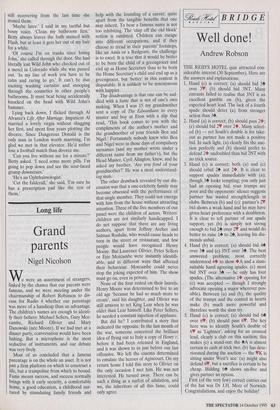Long life
Grand parents
Nigel Nicolson
We were an assortment of strangers, linked by the chance that our parents were famous, and we were meeting under the chairmanship of Robert Robinson to dis- cuss for Radio 4 whether our parentage was more of a handicap than an advantage. The children's names are enough to identi- fy their fathers: Michael Sellers, Gary Mor- cambe, Richard Olivier and Mary Danowski (nee Moore). If we had met at a dinner party, conversation would have been halting. But a microphone is the most seductive of instruments, and our debate was very lively.
Most of us concluded that a famous parentage is on the whole an asset. It is not just a firm platform on which to construct a life, but a trampoline from which to bound. Fame means success, and success normally brings with it early security, a comfortable home, a good education, a childhood nur- tured by stimulating family friends and help with the founding of a career, quite apart from the tangible benefits that one may inherit. To bear a famous name is not too inhibiting. The 'chip off the old block' notion is outdated. Children can escape into different occupations, and if they choose to tread in their parents' footsteps, like an Amis or a Redgrave, the challenge is to excel. It is true that it would be better to be born the child of a greengrocer and end up as Home Secretary than to be born the Home Secretary's child and end up as a greengrocer, but 'better' in this context is disputable. It is unlikely to be synonymous with happier. The disadvantage is that one can be sad- dled with a fame that is not of one's own making. When I was 15 my grandmother sent a copy of The Edwardians to every master and boy at Eton with a slip that read, 'This book comes to you with the compliments of the author's mother and the grandmother of your friends Ben and Nigel.' Fortunately nobody knew who Ben and Nigel were in those days of compulsory surnames (and my mother wrote under a different name from my father's), but the Head Master, Cyril Alington, knew, and he asked my brother, 'Are you fond of your grandmother?' He was a most understand- ing man. The other drawback revealed by our dis- cussion was that a one-celebrity family may become obsessed with the performance of that single member. They could not emerge with him from the house without attracting attention. Three of the five members of our panel were the children of actors. Writers' children are not similarly handicapped. I do not suppose that there are any living authors, apart from Jeffrey Archer and Salman Rushdie, who would cause heads to turn in the street or restaurant, and few people would have recognised Henry Moore. But Laurence Olivier, Peter Sellers or Eric Morcambe were instantly identifi- able, and in different ways that affected their behaviour. Morcambe could never stop the joking expected of him. The show must go on, even in private.
None of the four rested on their laurels. Henry Moore was determined to live to an old age 'because he had so much more to create', said his daughter, and Olivier was still anxious to act King Lear when he was older than Lear himself. Like Peter Sellers, he needed a constant injection of applause.
But did he? I contributed a story that indicated the opposite. In the last month of the war, someone conceived the brilliant idea of flying out to Italy a copy of Henry v, before it had been released in England, and it was shown to us just before our last offensive. We left the cinema determined to emulate the heroes of Agincourt, On my return home I told this story to Olivier on the only occasion I met him. He was not interested. He turned away. There can be such a thing as a surfeit of adulation, and we, the inheritors of all this fame, could only agree.










































































 Previous page
Previous page